This is a series of Magicicada photos from the 2018 Brood VII (Onondaga Brood) from Onondaga county New York. Read more about Brood VII.
These photos are BIG. Click/tab to see larger versions.
This is a series of Magicicada photos from the 2018 Brood VII (Onondaga Brood) from Onondaga county New York. Read more about Brood VII.
These photos are BIG. Click/tab to see larger versions.
Brood VII will return in 2035.
Update (June 17th): I just got back from Onondaga county and I can report that the emergence is in full swing. Lots of chorusing and mating. The best locations are around the Onondaga Nation reservation. If you visit, please do not trespass into the reservation — there are plenty of cicadas outside of it. John Cooley of Cicadas @ UCONN said there are also reports of cicadas in the Green Lakes State Park.
Here’s a video montage:
And a gallery:
Brood VII Magicicada septendecim 2018 Syracuse.
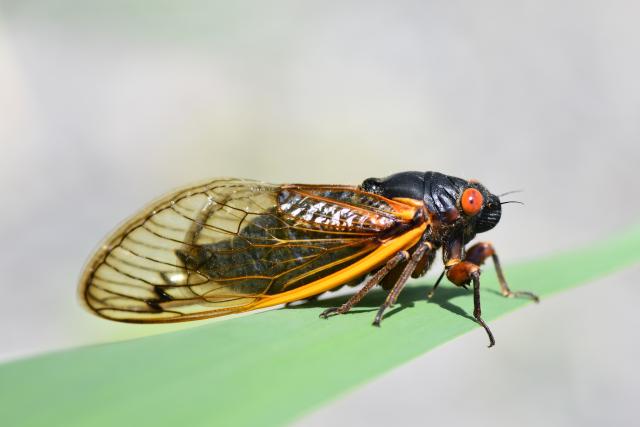
Periodical cicadas (Magicicada septendecim, people call them “locusts”) will emerge in the Finger Lakes area of New York state in 2018.
This group of cicadas is called Brood VII (7) and is known as the Onondaga Brood. This brood is shrinking, and will likely be the next periodical cicada brood to go extinct
A pair of Magicicada septendecim:
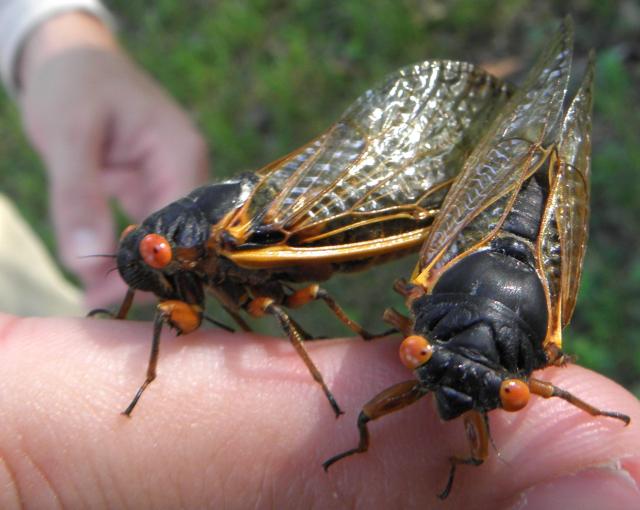
More details:
Further reading / viewing / listening:
Papers about Brood VII
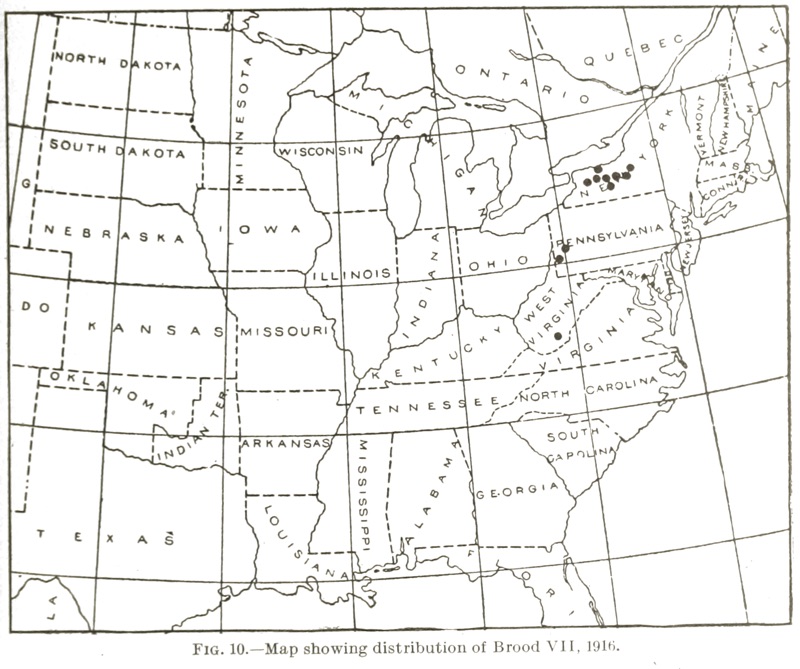
The Internet Archive has a lot of cicada documents and information, including a growing collection of articles from journals.
Today I came across a paper about Brood VII called The Periodical Cicada Brood vii Revisited (Homoptera, Cicadidae) by L. L. Pechuman, published in 1985 in the journal Entomology News (link to the article). Brood VII will be back in New York in 2018 (not too far away) so I’m glad I found this now. Brood VII is interesting because it is geographically isolated from other broods, near the Finger Lakes area of New York. This always makes me wonder what happened that led to their isolation (glacial melting, a massive die off of host trees… who knows).
The article is a quick, but melancholy read — unfortunately Brood VII is a small and dwindling brood; it has gone extinct in many areas, and has suffered over-predation by birds in recent emergences. “Populations were just not high enough to support ‘predator satiation'”, according to L. L. Pechuman.
People who witness massive periodical cicada emergences would never think that they were a fragile insect, but they are and papers like this make that fact abundantly clear.
 I am excited about the 17 and 13 year cicada emergences expected in 2014.
I am excited about the 17 and 13 year cicada emergences expected in 2014.
Here is what we can look forward to:
I’m looking forward to taking some vacation time and tracking cicadas. Brood XXII is a good excuse to visit New Orleans (even if it isn’t on the cicada map).
Fun fact: Brood III and XXII won’t emerge in the same year again until the year 2235.
These are the 17 most interesting 17-year cicada facts (IMHO). All these facts apply to 13-year cicadas as well.
People call these cicadas “locusts” but they are not true locusts — real locusts look like grasshoppers. The phrase “17-year cicada” indicates that they arrive every 17 years. The name “periodical cicadas” indicates that they arrive periodically and not each and every year. The scientific name for the Genus of these cicadas is Magicicada, and there are 3 types of 17 year Magicicadas: Magicicada septendecim, Magicicada cassini and Magicicada septendecula.
This is a true locust:
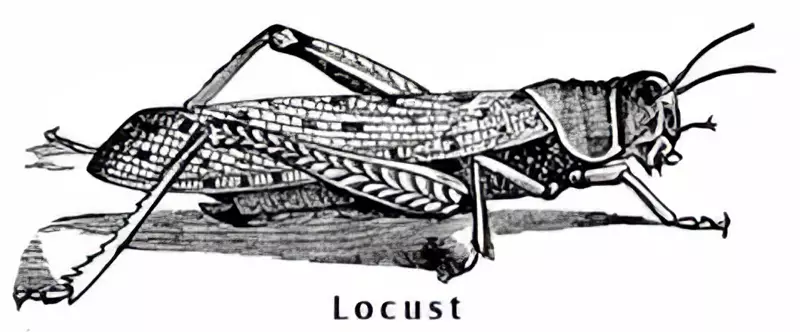
There are 13-year cicadas too! There are four species of 13-year cicadas: Magicicada tredecim, Magicicada neotredecim, Magicicada tredecassini, and Magicicada tredecula. Broods XIX, XXII and XXIII feature these cicadas.
Here’s a video that will help you identify the various species.
Most 17-Year Cicadas have red eyes, but they can also have white, gray, blue , or multi-colored eyes.
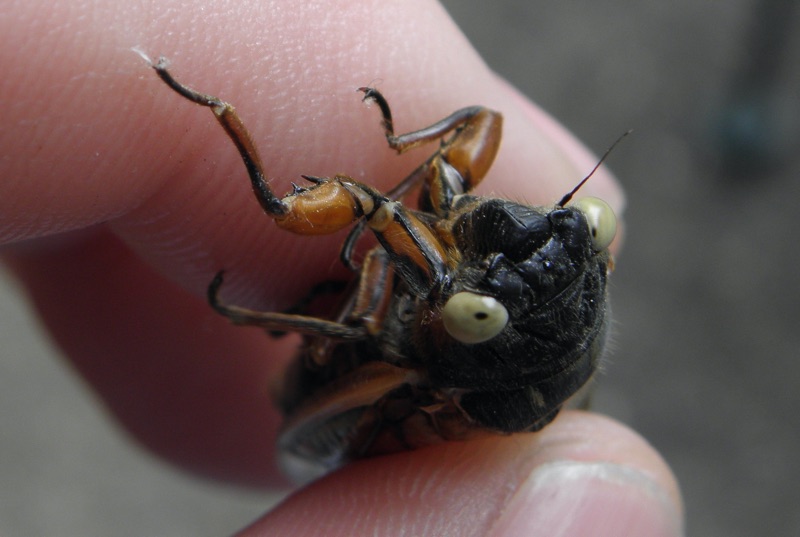
The Massospora cicadina fungus infects Magicicadas, destroying their abdomen and ability to reproduce. Often, their entire abdomen will fall off. The cicadas spread the fungus throughout their local colony via mating. The Massospora fungus is a cicada STD!
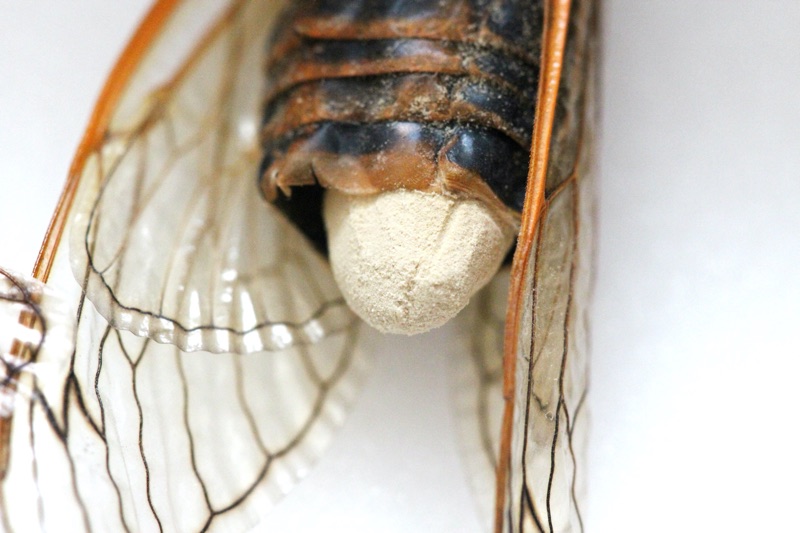
Cicadas think the sounds made by power tools and lawn maintenance equipment are made by cicadas. They get confused and will land on the people using the equipment! Pro-tip: cut your lawn in the early morning or near dusk when the cicadas are less active.

Cicadas have two, obvious, large, compound eyes, and three ocelli. Ocelli are three jewel-like eyes situated between the two main, compound eyes of a cicada. We believe ocelli are used to detect light and darkness. Ocelli means little eyes in Latin.
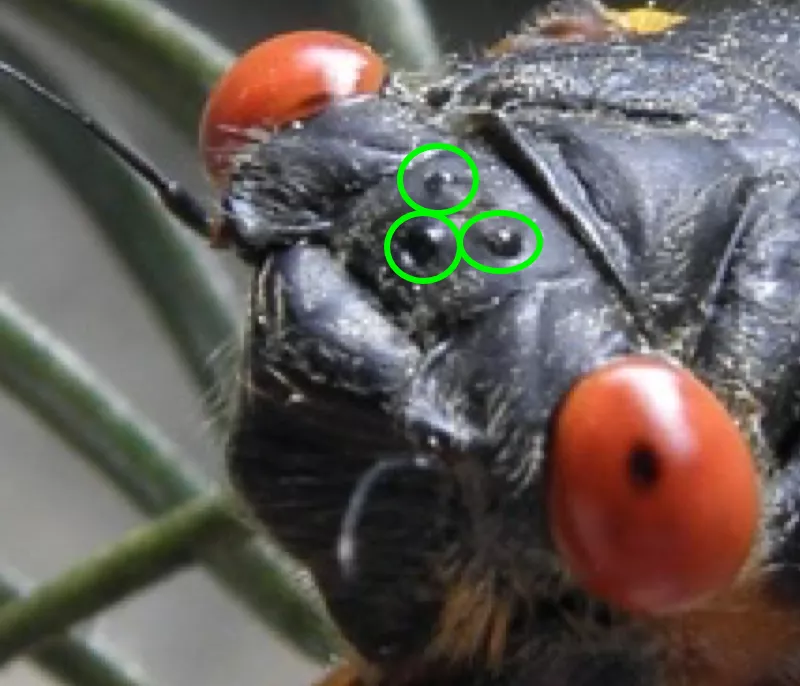
People eat them. You can barbecue it, boil it, broil it, bake it, sauté it. There, uh, cicada kabobs, cicada creole, cicada gumbo, panfried, deep fried, stir fried. There’s pineapple cicada, lemon cicada, coconut cicada, pepper cicada, cicada soup, cicada stew, cicada salad, cicada and potatoes, cicada burger, cicada pizza, cicada sandwich… that’s, that’s about it.

All wild animals and domestic pets will eat them. Dogs will gorge themselves until they choke. Squirrels will eat them like corn on the cob. Wild turkeys will grow fat and juicy on the cicada feast. Fish go crazy for them too — you can use them as bait, or use lures that mimic them.
Cicadas don’t eat solid foods like leaves or fruits. Instead they use their slender, straw-like mouth parts to drink tree fluids.
Yes cicadas pee, so wear a hat when walking under trees if that sort of thing bothers you. Cicadas drink tree fluids and then expel the excess fluid they do now need. People call it “honeydew” or “cicada rain”.
Only male cicadas make the loud sound they are famous for. Males have organs on their abdomen called tymbals. Muscles pop the tymbals in and out, which creates the sound we hear. Males make different calls for different reasons, and each species has a unique sound. Females can make sound too: they flick their wings to respond to males.
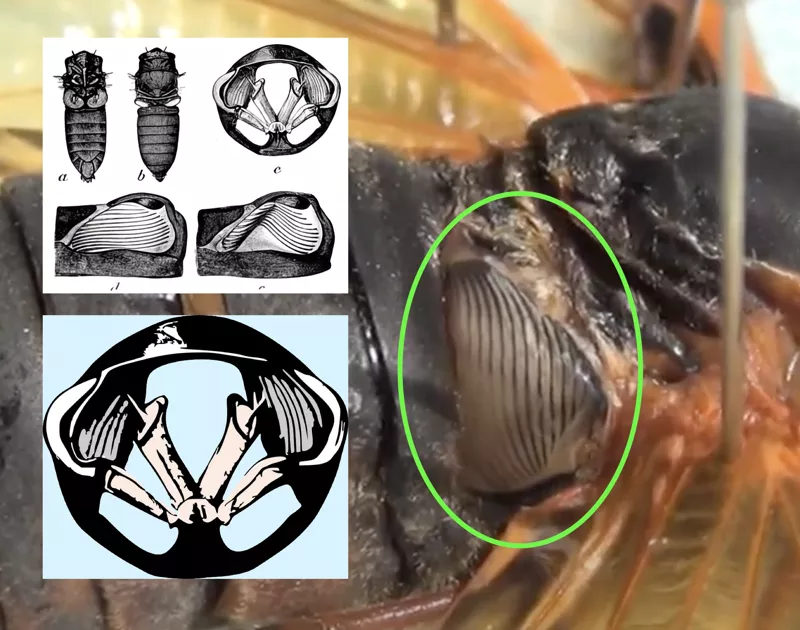
There are literally billions, if not trillions, of 17-year cicadas. Why? One theory suggests that a large number of cicadas overwhelms predators, so predators are never able to eat them all and cicadas, and many always survive to mate. This is a survival strategy called “predator satiation”.
The biggest concern about 17-year cicadas is their potential to damage young trees. The truth is they will damage limbs on the wimpiest of trees, so if you have weak, pathetic, wimpy ornamental trees in your yard you should consider placing netting around the trees if the cicadas visit your yard. Also, you can try hosing them off with water, placing insect barrier tape around the trunk of the trees, or picking them off like grapes! Or, plant strong, beefy American trees — that’s what I would do. Cicadas actually benefit the health of trees by aerating the soil around the roots and trimming the weak or damaged limbs.
Periodical cicadas that emerge in years before they are supposed to emerge are called stragglers.
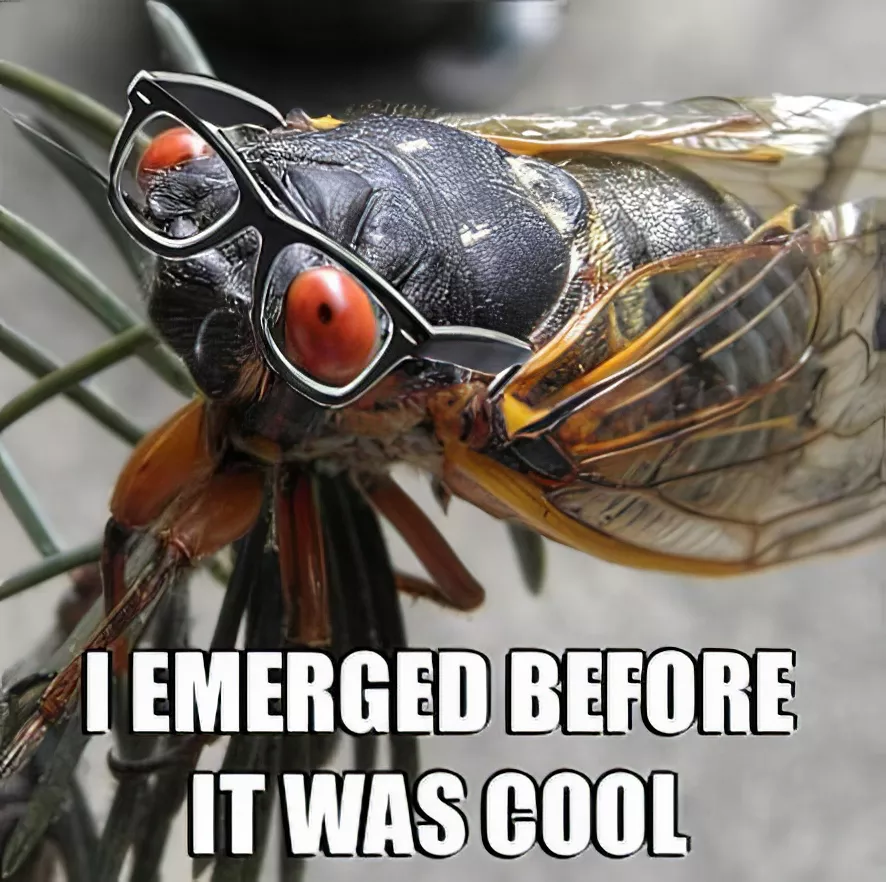
Scientist speculate that one reason why these cicadas emerge in 17 or 13 year cycles is because those are prime numbers. The fact that 13 & 17 are relatively large* prime numbers makes it difficult for predators to synchronize with them. (*Relative to the average lifespan of an animal.) Annual cicadas (cicadas that arrive every year) often have wasps specialized to prey on them; periodical cicadas have no such wasp because no wasp could evolve to synch with it.
Cicadas need to be warm to sing and fly around. Their dark skin absorbs the heat of the sun, which helps to warm them up.
Cicada Broods usually don’t overlap geographically, and it is very rare when they emerge in the same year. In 2024, Brood XIX and Brood XIII are both emerging.
###
If you have 18 minutes to spare, watch the video version of this article.
Date: Tuesday, Jul/31/2001
Though I can see peoples’ interest… I’m not a big fan of the Cicada. Are there any habitat criteria that minimize the occurrence of cicada? Would love to see a map denoting the habitat of Dog-day Cicada. — Donald, Knoxville TN
Date: Tuesday, Jul/31/2001
After 4 days of listening to these guys I finally got a snapshot of one. Feel free to add this to your site.http://www.fototime.com/99E7954065E023B/standard.jpgor, for a really big one:http://www.fototime.com/99E7954065E023B/orig.jpg — Bob, Tualatin, Oregon
Date: Sunday, Jul/29/2001
Ms Kitty, The cat, found a Cicada and was sort of stalking it, but it wasn’t moving. I stooped to check it out and it looked like it had been mauled. I did what now seems to be a very stupid action. I picked up the little feller and its wings where a mess, and it acted like it had a bad leg…hence I had decided it had been mauled… After taking it in and trying to straighten out its poor little wings, I put it on my desk, and using my desk lamp took some photos. I could not get the wings to do right so finally gave up. but in the meantime, my mind clicked over to a story I had heard of the man who tried to help the butterfly emerge from it’s cacoon and how the action had permanently injured the butterfly as it HAS to go through the stress of being born to enable it to get its wings in shape, dried, unfolded, etc and through the strain and anquish of birth it gets the strength to fly. I have a horrible feeling that perhaps this Cicada had not completed it morph as yet and that I interupted it and have permanently injured it. I placed it in an area outside where I thought it would be fairly safe, but I think perhaps I was its worse enemy for all my good intentions. Could this be true? I did get some good pics, though if anyone would like to see them, let me know.This was yesterday, 7 -28-2001 and I did notice several exo-skeletons hanging around on the foliage and building here, and while I at first thought the sounds were my usual ringing ears, have decided part of it is definitely the Cicadas making the music! — Leona Henderson, Smith Co Texas
Date: Sunday, Jul/29/2001
Last 10 have seen a min of 1000 cicada in my yard ,didn’t think this was the year for them. — Mike Underwood, Edna,Kansas USA
Date: Friday, Jul/27/2001
I have lived in Texas for about 10 years, This is the first yearI have seen cicadas. I have heard them and also have foundthe empty shells.Mike — Mike, Austin Texas
Date: Friday, Jul/27/2001
I saw a very large cidada emerging from it’s shell today near an old shed of mine. I live in the country, have a lot of fruit trees and berry bushes. They love it here. — Richard L Largen, Bethalto, IL 62010 Madison county
Date: Thursday, Jul/26/2001
back in may of 2001 i witnessed a large emergence of cicadas in silver city new mexico and i have not been able to identify the particular cicada . if anybody has any idea which one is common to this area, please e-mail me at debsay [AT] gilanet.com. thanks — debbie sayles, silver city new mexico usa
g
Date: Thursday, Jul/26/2001
in the evening when we listen to the cicadas at about 20.30 they stop making noise at 21.13 and then they stop completely at 21.35 is there a reason for this ????????????If you have an answer for me please mail me at y.bachy [AT] hetnet.nl — Yann, France
Date: Thursday, Jul/26/2001
Standing outside on a smoke break this A.M., I spotted a lone cicada on the brick wall of our office building. Put my fingers around him to take him into the builing briefly to show co-workers. He held onto the wall determined to stay. Didn’t want to injure it. He won. He really “rattled” away at me. When I let go of him and walked off, He flew off the wall and “smacked” me on the back!. He then flew off not to be seen again. When I lived in West Virginia, we called this kind the 17 year locust. Black, large red eyes, very big. Have never seen just “one”. Is he a “stragler” or what? I’m used to seeing thousands or none (in WV). — Chuck P, Nashville TN
Date: Wednesday, Jul/25/2001
I’ve never seen an insect like this before. It’s about a 1/2 long, white(blue under a light), and it flies atan incredible speed. It’s not a dragonfly or butterfly, but it may be a moth or a leafhooper. Do you know what this insect is? — bill watkins, montvile, nj
Date: Tuesday, Jul/24/2001
Here in the Las Vegas Valley area, Cicadas are a yearly occurance (to put it nicly). The last for a good 2 months or better and become just to much. I am looking for a way to discourage them in my yard and neighborhood. Any suggestions would be appreciated. Sounds like I should stay away from decidious and fruit trees. Perhaps I should box them up and sell them on e-bay…vegasnospamchip [AT] my-deja-no-spam.com — VegasChip, Henderson, NV (Just outside Las Vegas)
Date: Sunday, Jul/22/2001
Found a cicada, must have run into side of house, seemed a bit stunned at first. So cool looking! — Rhonda, Moscow, Ontario, Canada
Date: Sunday, Jul/22/2001
I was walking to the barn and found one half in half out. Been showing the kids. Didn’t know if it was 7 year or 17 year. Went to this page. I guess its a 17 year one. Thats older than my oldest child. — Sean Trowbridge, East Hampton, Long Island, New York
Date: Saturday, Jul/21/2001
I caught a large Cicada flying in the garage. We put it in a bird cage and it is now living on the deck. How can I keep it alive?I noticed 13 and 17 year broods are not in Illinois this year. What kind could this be?timmyds10 [AT] aol.com — Tim Schroepfer, Belvidere, Illinois
Date: Thursday, Jul/19/2001
I shot some good footage of a cicade after it emerged from its shell! Pretty cool to see, very green, and very wet looking.Since then (been a week ago) I have seen atleast 5 others near my home, one of which I accidentally killed… long story, and I feel very bad for it, but I picked one up after it was almost dry, tossed it in the air, it flew, landed on the street, and within three seconds a truck squished it. My family laughed at me, called me a killer, and after researching this bug, I feel like one…. amazing how long they live!I would love to find out what type of cicada I have seen.Email me!Later,Scott — Scott (jarhead [AT] homemail.com), Woodbridge, VA
Date: Thursday, Jul/19/2001
One landed on the picnic table last night when we were enjoying the outdoors – of course the kids snagged it. I’ve just been searching for more info. on Cicadas. I’ve lived in Colorado all my life – and although we “hear” locust every summer – cicadas are different from what I understand. I’ve only seen a couple of them “up close and personal”. They’re pretty cool! — Claire, Lafayette, Colorado, USA
Date: Thursday, Jul/19/2001
Do you know what species is the loudest cicada? where it lives and how loud it is? I recall reading that there is a cicada that can drown out the sound of a jack hammer. I can’t find the recourse and now I need to write an article for a local paper and I would love to include the above information.Thanx!!!My e-mail is Nature [AT] ci.rye.ny.us — Chantal Detlefs, Rye, NY 10580 Westchester County
Date: Tuesday, Jul/17/2001
actually, I could tag it with ‘for more info on cicadas, log on to cicadamania.com. but it’d be nice to have the program linked to your site.charlie.baglan [AT] mail.state.ky.usor 1 800 852 0942 ext 480 — Charlie Baglan, KY
Date: Tuesday, Jul/17/2001
I produce a weekly nature radio program for the Kentucky Department of Fish & Wildlife. I’ve been doing a series on the bugs of summer. Next week (Week of July 23) features Cicadas. It’ll be about 4 or so minutes in length. I’ll send you a link if you’d like to include it on your page. Advise please. Thanks. — Charlie Baglan, Frankfort, KY
Date: Tuesday, Jul/17/2001
It is a long story, but we put our kiddie pool over some ciceada holes. When we moved it 5 dead ciceadas were there. 🙁 Anyway 2 were alive. I kept them. One came out and its right wing was crinkled up at the bottom corner. The left wing had a pocket of liquid in it. I made a small hole in it and pushed the liquid out. Also on its back there was a bead of liquid. I wiped it off. Then it came back. The bead was moving in and out in and out like it was breathing. The cicaeda is very weak. HELP!!! — Someone, somewhere
Date: Tuesday, Jul/17/2001
It is a long story, but we put our kiddie pool over some ciceada holes. When we moved it 5 dead ciceadas were there. 🙁 Anyway 2 were alive. I kept them. One came out and its right wing was crinkled up at the bottom corner. The left wing had a pocket of liquid in it. I made a small hole in it and pushed the liquid out. Also on its back there was a bead of liquid. I wiped it off. Then it came back. The bead was moving in and out in and out like it was breathing. The cicaeda is very weak. HELP!!! — Someone, somewhere
Date: Sunday, Jul/15/2001
I am currently teaching a elementary biology summer class and happened to find an adult cicada just emerging from the ground. I’ve got it in a box to show the kids tomorrow and would love to find out what kind it is and how to treat it best. If you have info, please email me soon – lrandel [AT] thefreesite.com.Thanks! — Laurie, Wilmette, IL, USA
Date: Sunday, Jul/15/2001
We bought this house in December of 2000, and shortly after we started hearing the cicadas in the trees we noticed a lot of half inch holes in the yard aroun our trees along with a few of the exoskeletons of cicadas on the trees. I figured that the holes must be their burrows, but I wasn’t sure until I looked it up on the internet. They are a very fascinating insect with a remarkable life cycle. I’ve been fairly familar with the bugs for a long time, but I never realized that the lived underground for so long!! — mark k. mcgehee, Chattanooga,Tn
Date: Saturday, Jul/14/2001
After browsing through various links, I have discovered that our every-year cicadas are referred to as “dog-day cicadas”. Thanks for great sites! — Dianne, central Florida
Date: Saturday, Jul/14/2001
Here in Florida, our cicadas come out every year. I assume they are varying emergences of 17-year insects. We installed a pool and screenroom in 1990 and many cicadas emerge inside the screen. I go out several times a day to save the newly emerged insects, letting them dry outside the screen. My husband thinks I’m insane, but it’s a real treat to have a three-cicada-day! — Dianne, central Florida
Date: Friday, Jul/13/2001
The first Tibicen chloromerus of the year in Maryland was heard calling in Drayden, Maryland on Sunday, June 24th at 2:47pm (76 deg).The first Tibicen lyricen of the year heard calling in Maryland was heard on June 27 in Ridge, Maryland at 8:38pm (76 deg). These two cicadas have been calling daily since then along with Neocicada hieroglyphica. — John Zyla, Ridge, Maryland
Date: Friday, Jul/13/2001
Our healthy cat ate a cicada and died the next day. I think that the cicada’s beak might have started a chain reaction that resulted in acute heart disease causing fluid-filled lungs and loss of use of hind legs. Calvin’s agony, prior to the injection that ended it, cannot be overstated. Probably, usually a cat can eat a cicada without consequence for the cat, but please be aware! — Gayle, Minneapolis
Date: Wednesday, Jul/11/2001
Someone on down the line here mentioned droppings. Is THAT what’s in the seat of my lawn chairs???? Anyways, I love this site..what fun, down to earth, easy reading. Thanks. Kids and I are really enjoying the cicadas tonight. Glad we could get the ‘buzz’ on the insect of the eveing. — Kathy Blackmon, Mountain Grove, MO USA
Date: Wednesday, Jul/11/2001
Most of the people around us, do not like the sound from them (Cicada’s) I guess I’m the lucky one ,I can not hear them. Today a flock of birds that we have never seen in ths area before were here making a meal of them. — Gary, Surprise AZ.
Date: Tuesday, Jul/10/2001
I am 5 years old and my mom is writing this for me. My little brother has found some cases of cicada nymphs and we have read about the cicada life cycle. We want to know if we have the periodical 17 or 13 year cicadas or the annual cicadas in new mexico. thanks — benjamin thomas, corrales, nm
Date: Thursday, Jul/5/2001
The last time cicadas were in Chicago, we related after that the cicadas were the cause of the holes (lots) at the bottom of our yard pool. We had cut down 2 oak trees many years before for the pool to get sun. It was a hard choice to make but large family took precedent. We were stymied to figure how these holes occured till a kid on the block told us his friend had the same problem.. It was from cicadas trying to get through and found the pool lining. I don’t know what year it was and wonder if it will happen again and when. — BBansley, Chicago, Il
Date: Thursday, Jul/5/2001
My e-mail address is:tonnazzo [AT] hotmail.com; send me your answer for my questions — andrea, torino, Italy
Date: Thursday, Jul/5/2001
i am pleased to report that yesterday, july 4th, 2001, i made what are probably the first cicada sightings, (make that “hearings”), i have made in this area this year!! i was out in the boros of wyomissing, shillington, west reading, etc., for 4th of july events, and at long last i heard the unmistakeable sounds of our sweet little pavs coming from nearby trees, probably in at least two different places. unless i am mistaken, i have heard none this year, until yesterday, truly unique “fireworks” for the fourth!!! and what a way to mark that day!! plus, what a bright spot in a dark world!!! the first ones i’ve heard this year!!! send cicada info to “pavfinder [AT] hotmail.com” — kermit simon, temporarily of reading,pa.
Date: Wednesday, Jul/4/2001
There must be thousands of these bugs in the woods around our house. We even have to sweep up our driveway from the droppings. My wife says she can’t sleep with all the noise. Any way to get rid of these things? — jim rundle, guthrie, Ok
Date: Wednesday, Jul/4/2001
After a brief reading about Magicada I found out that they live for just few weeks after they emerged. I would like to know why do they die and why do they live for so short time above underground.Do you think is funny to live 17 years underground and then live for few weeks above the underground?thanks a lotandrea — andrea, turin (Italy)
Date: Monday, Jul/2/2001
On June 26, Date: Tuesday, Jun/26/2001, carol cushman of Boulder, CO asked ‘Many hundreds of cicadas were mating on pinon pines above Vermillion Creek (south of Rock Springs WY and a few miles east of the Green River)on June 20. Does anyone know what species this would be? Are they annual or periodic? CAROL – any luck identifying them? I am probably looking for the same species, and I’ll be in the area later this month. Let me know if you found anything. If not, I’ll ask around. — Wayne Jones, Saratoga Springs, NY
Date: Monday, Jul/2/2001
Delighted to find so many Cicada web pages! (Found this site while trying to find what species of cicadas might live along the banks of the Green River in Utah, where the trout reportedly eat those who fall into the stream. It reminded me that it is not just fish who relish cicadas.) Here is a tidbit about the relationship between humans and periodical cicadas I discovered as an entomology student decades ago. While collecting specimens in 1967 to document the range of Brood VII of M. septendecim, (helping Dr. Howard Pechumen at Cornell, while I attended Syracuse Univ.) one of the real hotspots was the Onondaga Indian Reservation near Syracuse, NY. (The sound of a major cicada hatch was amazing – we recorded a powerful undulating high-pitched sound that overwhelmed the senses – an erie blanket of sound covering the hills.) I remember being a little concered about what the Onondagas would think of college students prancing around the reservation with butterfly nets. Instead of making fun of us, however, they reassured us that there were plenty to go around, and gave us hints on collecting bushels of the insects, as well as tips on the best ways to cook them! (If you roast the newly-emerged ones before they “hatch” they are better than popcorn!) — Wayne Jones,Saratoga Spings, NY
Date: Saturday, Jun/30/2001
We suspect the cicada is laying eggs on our house wooden siding [rough finish painted brown] and when they hatch the paint flakes off.Any experts on this? E Mail me DonADunn [AT] ipa.com — Don Dunnington, Hot Springs Village, Arkansas
Date: Thursday, Jun/28/2001
What do the colorado cicadas look like?cicadakid [AT] hotmail.com — cicadakid, san diego
Date: Tuesday, Jun/26/2001
Many hundreds of cicadas were mating on pinon pines above Vermillion Creek (south of Rock Springs WY and a few miles east of the Green River)on June 20. Does anyone know what species this would be? Are they annual or periodic? — carol cushman, boulder, CO
Date: Sunday, Jun/24/2001
All your cicadas are belong to us! — Cats, Space
Date: Sunday, Jun/24/2001
Hi, I’ll be in California and Nevada next week looking for cicadas. –Dan, New Jersey
Our small town in rural North-Eastern Nevada has been taken over with Cicada –Bill Tilton, Crescent Valley Nevada
Large number of cicadas in Great Basin Sagebrush this year. I believe they are Okanagana cruentifera but need more information –Scott, Bishop, CA
I just moved to Flagstaff from Massachusetts six months ago and live up in the woods in Flagstaff. For the past two weeks or so there have been cicadias everywhere! The sound is great! Noone here can ever recall seeing them around here. Are these periodic cicadias? According to the map this site is linked to, there shouldn’t be an emergence now in this area. Tarcia (tarcia [AT] earthlink.com) –Tarcia, Flagstaff, Arizona
I found a very large nasty looking entity in my window ledge this morning, my husband says its a locust but in reading I see it could be a Cicada, whatever those are! How do I tell which it is and do they come out night and day? How big are the swarms? Will they hurt people? The one I found was about 2-3 inches in length and large wings, I thought at first it was a mammoth moth but no. Anyway it grossed me out and now I fear the outdoors!!! Send info please to bubbawease [AT] gpcom.com thankyou and eeeeewwwwwwwwwww YUCK –Louise Scofield, Hooper, Nebraska
hi I want to know Why do Cicadas spray you –rhonda coffin, palmerston north
On June 16, 2001 at 7:20 p.m., I found a female Tibicen chloromerus nymph which had just emerged from its burrow a few inches away(and two feet from my porch!) It successfully enclosed overnight and positive identification was made the morning of June 17. As with Neocicada hieroglyphica, emergence of T. chloromerus seems to be about 2 weeks ahead of normal in this area. I now eagerly await the first call of a male T. chloromerus. –Brian J. Prichard, Grayson, KY, USA
6/16/01 We always have cicadas in the summer, but for the first time I discovered a live one and now I’m totally hooked! She was a lovely pale green when I rescued her and seemed to darken throughout the day. She was content to cling to sticks and my finger…a perfect model for my many sketches. I released her in the evening when she seemed to become more active. What lovely, fascinating creatures. Hopefuly I’ll have more houseguests like her! –Jane, St. Louis, Missouri
When I was in California last year I spent a wonderful evening just sat on the back steps of the hotel drinking wine and listening to the cicadas. I’d really like to do the same now I’m home. Does anyone know where I can buy a CD/tape of cicadas singing continuously so I can turn this little bit of London into California every evening, weather permitting. –Sarah , London, UK
Yesterday, I traveled to some woodlands just north of New Richmond in Ohio. What I found was an abundance of Magicicada cassini and septendecula. All along an area of twelve mile road and the surrounding areas, I heard loud chorus’s and located ovipositing females. The area reminded me of Brood V. Last year’s emergence in Ohio was nothing compared to what I just witnessed. This may be considered an early emergence of Brood X or it just may be the formation of a new Brood VII in Ohio. Only time will tell… –Les Daniels, Fremont, Ohio U.S.A.
The first Neocicada hieroglyphica was heard calling Sun, June 10 at Cove Point, Calvet County, Maryland at 3:00pm (80 deg) by Arlene Ripley. This is one day earlier than the previously earliest record (Jun 11, 2000) Another N. hieroglyphica was heard today, June 11 at Patuxent Naval Air Station in Saint Marys County, Maryland (12:01pm, 84 deg) –John Zyla, Ridge, Maryland
Plenty of cicada activity the last week of May in the pinon-juniper forests. Cannot find information on the western varieties. Damned interesting to watch though. –Paul Menard, Grants, New Mexico
Plenty of cicada activity the last week of May in the pinon-juniper forests. Cannot find information on the western varieties. Damned interesting to watch though. –Paul Menard, Grants, New Mexico
I was walking outside onday, when in the brushes I heared somthin! I looked and saw a cicada being attack by a large red spider! I took a stick, and dragged it to safety Then I made a mark on it with a gel pen,And Said,’You are now the king of cicadas! Your name is Cate!” –St , unknown
ONCE I SAW CICADA PUPA THE NEXT DAY THEY WERE CICADAS! WITH CRUMBLED WINGS! –ST, UNKNOWN
I hear cicada’s sound in my back yard. When I was here 2years ago, I did’t hear. Last year I was in Japan and, of course, I enjoyed the cicada’s sounds. If anybody know about cicadas in San Diego or California, please teach me about them. –Megumi Vogt, San Diego, CA
No rain since last November, first noise of our cicadas predict six weeks until the rainy season starts in June! We head ours May 1st, weather forecasts rainstorms in Guadalajara area since June 5th…everyone doing rain-dance! Not sure whether the dance or our “rain-birds” cause this, but it has worked here for decades. –Arturo, Lake Chapala,Jalisco, Mexico
We live about 35 miles North Of San Antonio in the Hill Country surrounded by trees and they are all around us day and night. –John, San Antonio, Texas
6/7/01 Three days of a high pitched incessant buzz, actually quite annoying. Finally caught one, and set out to find what it could be. Found a cicada link on the web, and there it was, exactly like the one in our jar! Once identified, we put him back out in the wild again. Thank goodness they’re not around every year — what a noise! –Wendy Reed, Quartz Hill, California (60 mi N of L.A.)
had no idea what these things were until surfing the web. all i can say is THEY’RE HERE! –cory, nedrow,onodaga cty,n.y.
I was so happy becasue I met a lot of 17years cicadas in NY last weekend. (06/02/2001) They were very cute. –Yuko Yokota, Rockville,MD
06-05-01 I heard the first Neocicada hieroglyphica today at 11:30 a.m.. Usually N. hieroglyphica begins emerging around June 20 in this area(when seasonal temperatures are normal.) However, April temperatures seemed above normal this year. I will get NWS area records for current year shortly. The weather has been rainy for the last two weeks. If interested, I have emergence records of various cicada species (Magacicada, Tibicen, and Neocicada) over the last ten years. Contact me at: tibicen [AT] email.kcc.edu –Brian J. Prichard, Grayson KY
June 4, 2001 In the last week we have observed large numbers of cicadas emerging from holes in the ground. I have walked around my twenty acres and hear them everywhere. Also, along the roadside as we drove into town (a 35 mile drive) we could hear the buzzing. We live in western New Mexico and this is the first time we have seen this. (We’ve been here 3 years.) –Paula Tripodi, El Morro, New Mexico, USA
If you know of any place that sells cicada garden art, please e-mail to gholbert3 [AT] home.com. –gholbert, mobile, al
I’m interested in cicada garden art–hangings, molds in terra cotta or metal, etc. I’ve searched on the Internet to no avail. Does anyone know of such a site? –gholbert, mobile, al
I always enjoy seeing photos of Japanese cicadas! My interest is in the non-periodical cicada species. Having lived in Japan (Honshu, south of Tokyo) I collected cicadas there for many years. Every summer, the number of cicadas there rivaled the numbers of even our largest broods of Periodical cicadas here!! (and without the huge mess left over by our swarms!) The sound was much more rich and varied. I was thrilled to find the ‘Animal Sounds on the Net’ website, and hear some of those wonderful songs again! Especially of my favorite type, the giant Kuma-semi. This type was rare in my area, but when one was singing in the hills near my house, its song stood out sharply from the constant roar of the millions of other singing cicadas! And no wonder! It is the largest cicada I’ve seen. Much larger and bulkier than even the big T. Japonicus, its olive-green drum-covers are 3/4inches diameter and its voice has tremendous volume. The last year I was there I drove up to the lake Ashi area and found the Kumazemi quite abundant and collected several. It is a Tibicen-type cicada, with the very wide head of that genus, shiny, polished black body, with some fine gold scale on newer specimens, clear wings with bright green-yellow veins, and the underside is powdered white, with bright orange legs, opurcula. I would like to correspond with others who have a love for the cicadas of Japan! I wish I had traveled more in the country while I was there, I only saw and collected about a third of the species, not knowing there were others!! Also, I would like very much to know of any other websites that feature the cicadas of Japan! Many thanks for being here for us cicada-lovers! –Fred Berry, Alexandria, VA. USA
05-29-01 Fair size hatching of Cicada in this area over the last couple of weeks. Not sure what variety. The siren-like buzz noise is almost deafening in the woods. –Mark Cipollone,
(5-27-01)It appears the periodical cicadas along the Ohio river here in South-Western Ohio have jumped the gun by about 7 years. I heard scores of them in Brown & Clermont counties here. I also saw around 12 or 13 emerging last night while I was camping with family along the riverbank. I wonder why the little buggers decided to come out years ahead of schedule?? –Roy Troutman,
We are in roughly the third week of the emergence of Brood XXII. I came upon your site trying to learn more about this interesting phenomenon. Personally, the sound is driving me nuts! But my dog has found a new source of protien. –Tracey Banowetz,
5-22-01 Under a tree at a East Houma Louisiana(way down South)hospital, I saw the tell-tale signs of a cicada brood. There were the holes in the ground by an Oak tree. I looked on the tree and I found a cicada exoskeleton. I hadn’t seen one since moving from Shreveport Louisiana 22 years ago. –Michele Cunningham,
05/21/2001 For the past few days we’ve been listening to the Cicadas. We’ve seen very few – but they’re definately out there. –Annette Corkern,
You can’t go outside with out stepping on a Cicada!! There out so thick that one night i was smoking a Bliznunt and i came inside to watch a little tv and then i felt and heard this vibration on the back of my neck. I started wiggin’ out and ran outside to get it off! I’ll just put it like this…They are EVERYWHERE!!!!! Shake them Haterz of CICADAS!!!!! –Ross, Vicksburg, MS USA
In some countries of Europe where have no cicadas, people think the droning of large brown cicadas just like as a machine noise. Especially, they think so when they hear only the sound on TV or on radio. On this opinion, I want to know if it’s true, and if so, which countries do people feel like this. –Yoshio UENO, Tokyo, Japan
i don’t know who left that top “message”, but i love these sweet little things. last year (2000) one couldn’t go anywhere around here, even in this crumby city, without being sung to. these little things are a bright, even if somewhat strange spot, in a very dark world. i hope for a ‘repeat performance’ of last year this summer. i also hope for a quick and permanent exit back to western massachusetts, where i spent some time this past fall and winter. i hope each summer up there is a “repeat performance”, when these little pavs come out of the ground and ‘strut their stuff’. send cicada info, and especially info on cicadas in western massachusetts, to [REMOVED] –kermit simon, temporarily of reading,pa
Periodical cicadas are emerging in parts of the Greater Cincinnati area. I have received reports of heavy emergences in Clermont Co, OH and in Northern Kentucky. Last night 25+ emerged at the College of Mount St. Joseph campus. Updates are being posted at www.msj.edu/cicada. –Gene Kritsky,
Cicadas everywhere
–Brian, Natchez, MS
I’m really sorry I couldn’t see emergemce of cicada in MD last year,because of I have moved here last september. so I’m going to go NY to observe 17years cicada. I’m looking for exact locations and dates. If someone know it,please let me know. –Yuko Yokota, Rockville,MD
05/08/2001 *We have noticed an emergence of cicada (apparently the 13yr variety)in the last week, so far in a ten-mile radius, with huge conglomerations in areas emanating a “sea-shell” sounding roar heard from a distance habitating near concentrations of mostly oak trees where they have left large numbers of half-inch sized holes. –Tom F.,
I thought I noticed a cicada on May 20 01 while mowing. Today, exactly a week later, they are easier to find and are in song amongst trees in all directions. If I recall correctly (after all, it’s been 17 years!), there should be quite a “cavalcade of cicadas” in a few days. Their levels aren’t all that impressive at the moment, but, based on the two previous eras when I noted their arrival, the little critters should quickly populate the forests here, particularly if temps get out of the high 60s and warm to something more enjoyable for their flying and crooning abilities. –Robert, Southern Onondaga County, NY